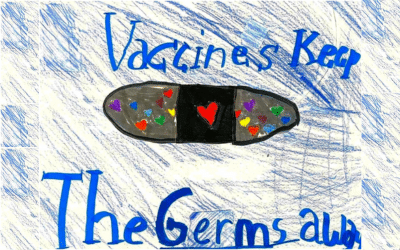
By La Salle Academy Healthy News reporters | If you feel nervous when you get a vaccine, just remember what that shot will do for you. It will reduce the chances of you and other people getting sick, according to Dr. Kristen Feemster, a vaccine expert.
Vaccines help teach your body to protect itself against different infections, she says.
They have another important purpose: They can help people in your community stay healthy.
“When you don’t get an illness or an infection,” says Dr. Feemster, “you can’t spread it to other people.”
Dr. Feemster has worked with vaccines in lots of different ways during her career. She is a doctor who specializes in taking care of children and has given a lot of shots. She also has been a vaccine researcher. Now she is the executive director of Global Medical and Scientific Affairs for Merck, a pharmaceutical company that makes vaccines and medicines.
Dr. Feemster answered questions about vaccines during an interview with La Salle Academy Healthy News reporters. Their interview has been edited and shortened.
Question: Please explain what you do at Merck.
Dr. Feemster: I work on a team that is responsible for learning what we need to know to make and introduce new vaccines all over the world. We have to learn about different infectious diseases, how often they happen, and whom they affect. This helps us know the best way to prevent them.
Question: What is a vaccine and why is it important?
Dr. Feemster: A vaccine is something that helps teach your body how to protect itself against different infections. A vaccine exposes your body to a very small piece of that virus or bacteria—not enough to make you sick but just enough to turn on your immune system to make antibodies. The antibodies protect you in case you’re exposed to that infection.
Question: How do people make sure that the vaccines are safe?
Dr. Feemster: Safety is an important part of vaccine development from the beginning. People working on the vaccine check for any problems that people might report.
Question: What happens in your body when you get a vaccine?
Dr. Feemster: It often may go into your muscle, right under your skin or it can be inhaled in your nose or taken by mouth. When your body sees the vaccine, your immune system sends signals and tells your body to make some antibodies. The antibodies travel through your bloodstream. If it’s injected into your muscle, it usually doesn’t even have to go very far to start working in your immune system. Vaccines also help your immune system make cells that remember the germ if you are exposed to it. Then you can make new antibodies to protect yourself from infection.
Question: Why are you sometimes sore the next day after you get a vaccine?
Dr. Feemster: The reason you’re sore is because you are activating your immune system. It can make you feel a little bit sore right in the area where you got the vaccine. Sometimes you can get redness, swelling, and it can hurt, but that is a sign that the vaccine
Question: What happens when you don’t get a vaccine?
Dr. Feemster: If you don’t get a vaccine, then you may not be protected if you are exposed to that germ. And you may be more likely to get sick.
Question: How do doctors decide when and at what age people should get a certain vaccine?
Dr. Feemster: The people who make decisions about when people should be vaccinated think about when kids or adults are most at risk of being infected by a virus or bacteria.
Question: What else should children know about vaccines?
Dr. Feemster: I think it is important that we have good information about vaccines so that we can help address concerns to people who are worried about them.
Illustration by a Healthy News reporter.






